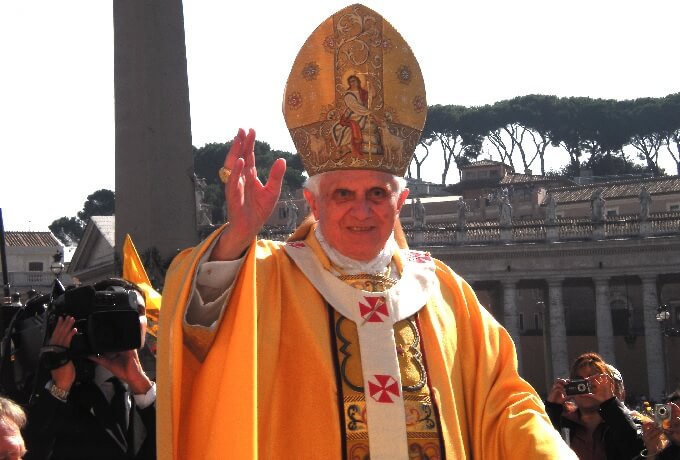Which pope, long before being raised to the papal office, criticized “the all-too-predetermined dogmatic reading” [1] of the Bible, and later, having exercised that office, continued promoting this belief “that theology obviously has its own freedom and task, that it cannot be completely servile to the Magisterium” [2]?
Many people today would be surprised to learn that these words came not from Pope Francis, but rather from Pope Benedict XVI. After all, most of the American media and pop culture consider such openness to questioning Church doctrine to be aligned with the former’s supposedly “flexible” mentality and opposed to the latter’s supposedly “rigid” one. However, they fail to remember that Joseph Ratzinger, the future Pope Benedict XVI, was actually considered to be progressive before the Second Vatican Council due to his attempts to de-emphasize the mainstream, traditional theology of Neo-Scholasticism – the study of natural law and the thought of Saint Thomas Aquinas, “whose crystal-clear logic seemed to [him] to be too closed in on itself, too impersonal and ready-made” [3]. Benedict thus made the then-progressive decision to focus instead on Personalism – the method of approaching theological knowledge through contemplation of the things closest to the human heart: desire, dialogue, relationship, and love. In short, Ratzinger, as he would later say after his resignation from the papacy, “wanted to renew theology from the ground up, and thereby form the Church in newness and vitality” [4].
This may sound like the same goal as that promoted by “progressive” Catholics today, but it had one massive difference: it remained obedient to the Church. While Ratzinger certainly encouraged critical thinking about Catholic teachings, he also believed that obedience to the Magisterium is necessary and praiseworthy. For example, he praised one of his professors, Gottlieb Söhngen, for giving the following response when someone asked him what he would do if the Assumption – a not yet defined teaching he vehemently opposed – were dogmatically defined: “If the dogma comes, then I will remember that the Church is wiser than I and that I must trust her more than my own erudition” [5].
This shows a profound sense of humility too often lacking in the faith of “progressive” Catholics today, who frequently hold their own judgments to be more authoritative than the Magisterium’s (especially on moral issues in which the Church disagrees with secular culture). Moreover, as Pope Benedict XVI, Ratzinger similarly extolled the obedience of Peter Abelard, the renowned but sometimes heretical theologian who eventually “showed humility in recognizing his errors” and “died in full communion with the Church, submitting to her authority with a spirit of faith.”
Yet Pope Benedict XVI simultaneously commended Abelard for “submitt[ing] the truths of faith to the critical examination of the intellect,” revealing that theology should be approached “both critically and with faith” [6]. After all, theology is defined (in the words of Saint Anselm of Canterbury) as “faith seeking understanding”: the former entails a trusting attitude, and the latter a critical one; the former inspires assent based on others’ trustworthiness even when we do not completely understand, and the pursuit of the latter inspires questioning our beliefs – even the ones to which we have given the definitive assent of faith – in order to gain deeper insight into them.
Ratzinger himself displayed this interplay between critical thinking and obedience, being adventurous enough in his questioning to present in a 1972 essay an argument for Communion being given to the divorced and invalidly remarried – an immoral act (though he did not yet know it to be immoral, of course) – yet humble enough in his faith to later retract it in submission to the Magisterium. Concerning his essay’s suggestions about this immoral act, he explained in 1991, “Their implementation in pastoral practice would of course necessarily depend on their corroboration by an official act of the Magisterium to whose judgment I would submit[.] … Now the Magisterium subsequently spoke decisively on this question in the person of [Pope John Paul II] in Familiaris Consortio” – and it spoke against Ratzinger’s 1972 argument, which he consequently edited out of future editions of the essay and consistently condemned in his future statements.
And now, the current pope has tacitly allowed this same immoral act through his recent apostolic exhortation Amoris Laetitia, and a few courageous cardinals have challenged him on it by submitting dubia – yes-or-no questions meant to clarify disputed doctrine – to him. So he now faces a choice: he can continue to remain silent (his current course of action), or, in obedience to the consistent teaching of the Church, he can respond by retracting his exhortation’s purposefully ambiguous language, language that intentionally leaves itself open not only to orthodox interpretations, but also to heretical ones.
The former course of action would ultimately prove Ratzinger’s wise words: “I would not say that the Holy Spirit chooses any particular pope, because there is plenty of evidence to the contrary – there have been many whom the Holy Spirit quite obviously would not have chosen!” (words that gain even more power coming from a man who would later become pope). The latter choice would beautifully confirm the current pope’s reputation for humility, placing him in the same saintly ranks as his predecessor, the pope who was humble enough not only to walk away from the papacy – a nearly unprecedented act requiring him to courageously admit his limitations – but also to admit his mistakes.
[1] Ratzinger, Joseph. Milestones: Memoirs, 1927-1977. San Francisco: Ignatius, 1998. Kindle Edition.
[2] Pope Emeritus Benedict XVI. Last Testament: In His Own Words. London: Bloomsbury, 2016. Kindle Edition.
[3] Ratzinger, Joseph. Milestones: Memoirs, 1927-1977. San Francisco: Ignatius, 1998. Kindle Edition.
[4] Pope Emeritus Benedict XVI. Last Testament: In His Own Words. London: Bloomsbury, 2016. Kindle Edition.
[5] Ratzinger, Joseph. Milestones: Memoirs, 1927-1977. San Francisco: Ignatius, 1998. Kindle Edition.
[6] Ibid.


